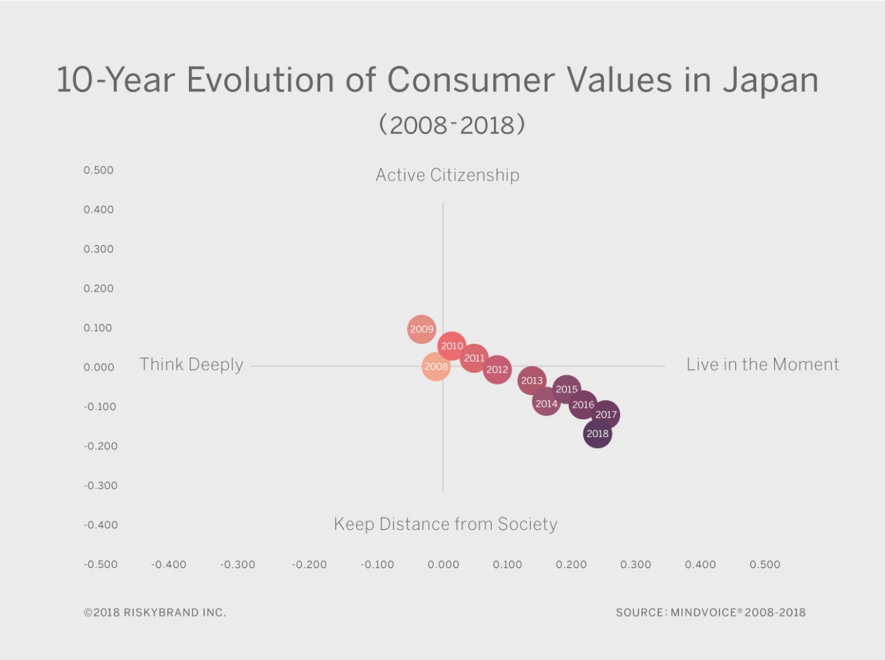By Kazuteru Tasaki and Apolline Coat
If it is possible to attribute a dominant mood to an era, ‘cynical’ might be the most suitable adjective to describe Japan in the 21st century. This is the conclusion drawn after ten years of social values tracking by RISKYBRAND Inc, in Tokyo. This conclusion has been reached by measuring the pulse of 4’000 Japanese consumers yearly since 2008.
Starting today, over the course of a three-part series, we examine the rise of cynicism in Japanese society and its impact for businesses.
Measuring the Zeitgeist
Using principal component analysis¹ 41 social values can be reduced into two groups:
- mode of interaction with society
- considered thinking patterns
The resulting chart exposes the evolution of the `center of gravity’ of social values in Japan from 2008 to 2018.

We can see that except at one point in 2009 (just before the collapse of Lehman Brothers), the center continuously shifts to the bottom right, in a movement towards ‘living in the moment’ and ‘keeping distance from society’.
Modern cynicism has been defined as “an attitude of distrust toward claimed ethical and social values and a rejection of the need to be socially involved” ². Numerous studies have exposed the rise of modern cynicism in advanced economies, at both societal and consumer level. According to Edelman’s 2018 trust barometer, Japan has the lowest level of trust in institutions across all studied markets. The desire to limit contact with society that can be observed on the y-axis of the chart derives from this sentiment. On the x-axis, the shift from ‘thinking deeply’ to ‘living in the moment’ is highly reminiscent of the ‘YOLO’ (You Only Live Once) philosophy that encourages us to enjoy the present regardless of the consequences. In Japan this behavior is rooted in anxiety about the future.
A closer look at the data identifies seven remarkable attitudinal shifts which support that cynicism is growing in Japanese society.
1) Growing indifference to others
The number of people who ‘don’t think that the lifestyle or circumstances of others has any bearing on their own’ has increased by more than 30% in ten years. By allowing people to reach out to masses from behind their screens, the digital revolution has contributed to dehumanizing interactions, resulting in a growing indifference to others.
2) Skepticism towards relationships
The claim that ‘people around me don’t understand me well, and therefore judge me unfairly’ has increased by 13% since 2013. The consequences of the disillusionment towards relationship can be observed in the social phenomena of hikikomori (recluses) and a large segment of population opting out of social and romantic relationship. A 2015 survey from the Cabinet Office found that almost 40% of unmarried Japanese in their 20s and 30s don’t want a relationship, citing lack of time and money, and no interest in the opposite sex as reasons.
3) Dilution of emotions
People stating that ‘they are easily moved’ has decreased by 17% since 2008. This indicates a drift towards apathy. This can be interpreted as a desire to close one’s emotional pores to ease disappointment and avoid being hurt.
4) Exacerbated risk aversion
In 10 years there has been a 24% decrease in people who ‘are willing to take risks to accomplish what they want, regardless of what others may think’. Such ‘no gain but no pain’ mentality manifests the population’s pessimism for the future.
5) Focus on momentary pleasure
Claims of people ‘not worrying about tomorrow as long as they are enjoying themselves now’ have increased by more than 40% over the decade. This reflects the premise that when the future looks dull, it seems natural to prioritize immediate pleasure over other concerns.
6) Luxury goes mainstream
People ‘often wearing expensive and prestigious items’ has increased by 30% in the past 10 years. A paradoxical result at a time when consumption is shifting from material goods to experiences. However, for the cynical customer, indulging in the finest things in life can be a way to make the most of the present.
7) Disdain for status symbols
People thinking that ‘wearing status symbols is the sign of an unsophisticated person’ has increased by 20% in the last decade. Disregards for status symbols is a form of resistance to society. By loathing professed badges of success, the consumer expresses his rejection of normative behavior and his desire for emancipation.
In the next parts of the series, we investigate:
- The roots of cynicism in Japan – published on Wednesday 12th December
- The implication of the rise of cynicism for brands – published on Friday 15th December
Click here to read the full report of Cynicism on the Rise in Japan.
By Kazuteru Tasaki and Apolline Coat, RISKYBRAND Inc


